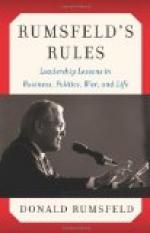in the telegrams, but which are assuredly not idle.
Lord Methuen has long held a crossing on to the peninsula
or Doab between the two rivers, and the advance of
a division into this peninsula must compel the prompt
evacuation of Jacobsdal or bring about the ruin of
any Boer force there, while at the same time it would
increase the weight of troops that intervene between
Magersfontein and Bloemfontein. A single division
is a more than ample force to cover the British railhead
at Modder River. Commandant Cronje may elect
to fight where he is, which would be to court disaster,
for he would be attacked from the east in great force,
with no retreat open except to the west away from his
base, and with a considerable river, the Vaal, to
cross. Such a retreat after a lost battle and
under the pressure of pursuit would be ruin to his
army. He may move off by Boshof, but that would
be impracticable unless the start were made soon after
the first news of the British advance. On Wednesday
he would have only the mounted troops to deal with;
even on Thursday (to-day) the sixth division could
hardly be used with effect on the north bank of the
Modder, but on Friday he would have the sixth and
seventh divisions to reckon with. Probably his
best course would be to retire before he can be attacked
to Barkly, on the right bank of the Vaal. He
would there be in a position most difficult to attack,
and yet his presence there on the flank of any British
advance either to the north or to the east would make
it impossible to neglect him. His decision has
been taken before now, or this opinion would have been
suppressed out of deference to the anxiety of those
who imagine that strategical advice is telegraphed
from London to the Boer headquarters.
Of the effect of the new move upon the general course
of the war it would be premature to enlarge.
We must wait and see the close of the first act.
The most effective issue of this week’s movements
would be a battle leading to the thorough defeat,
the military destruction, of the Boer army before
Kimberley. A less valuable result would be the
raising of the siege of Kimberley without fighting,
a result which is not to be preferred, because a force
that retires before battle has to be fought later
on. For this reason the true Boer game is to retreat
in time.
It will be interesting to watch the effect of the
new campaign upon the ripening resolve of the British
Nation to have, its Army set in order. Upon many
minds, and no doubt upon Ministers and their adherents,
the impression made by success in the field will be
that reform is needless. The true impression
would be that it is as urgent as before, and that
the right way to begin is to give authority to the
right man, the commander who is now revealing his
strength.
CRONJE’S SEDAN
February 22nd, 1900
A week ago the news was that Lord Roberts had begun
his movement, that he was moving with fifty thousand
men against Commandant Cronje, and that General French
with the cavalry division had crossed the Modder,
the sixth and seventh divisions following him between
the Riet and the Modder.




